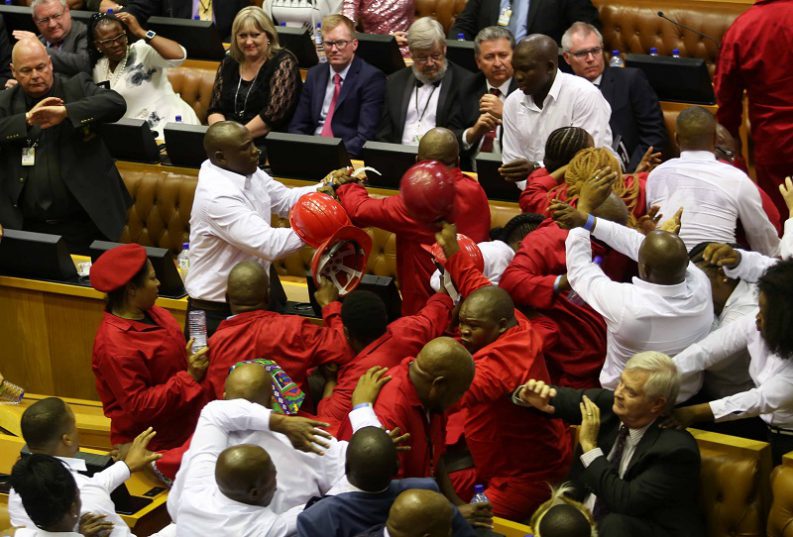Parliament has revealed that it recruited active police officers to become part of its protection services because its existing protection officers did not have the necessary critical skills required to engage with and control unruly MPs.
This emerged in court papers, filed this week, in which the House disputes accusations of unfair discrimination against its protection officers after having recruited active cops at higher salaries.
Sixty-nine long-standing protection officers took Parliament to the labour court in December, citing unfair discrimination.
In July 2015, Parliament moved speedily to enlist officers from the SA Police Service (SAPS) to become part of its protection services. This in a bid to enforce a new rule, which provided for disruptive MPs to be forcefully removed from the House.
The hiring of the police officers, who had no parliamentary experience, on better terms and conditions led to tensions in the protection unit.
In May 2016, City Press revealed that Parliament had reshuffled its staffing structure to create new positions to accommodate the former cops at a better annual pay level of up to R150 000 more than the existing team of parliamentary protection service officials.
The court papers confirm that the so-called white shirts were hired as “chamber support officers”, at salary levels higher than the existing protection staff.
They also confirm that the white shirts’ new job titles separated them from existing protection officers and, in effect, split the parliamentary protection service.
Parliament said the newly designed positions provided for critical skills and capabilities, including the following:
– The ability to effectively handle disruptions in the House and secure the “safe physical removal” of MPs;
– The ability to respond to emergency situations in the House, thanks to active police officers being experienced in security practices and procedures, and being physically fit; and
– The ability to work in a team.
The 69 applicants claimed that at no stage was it made known to them what the “necessary capabilities” were and that no formal human resources processes were followed in appointing the new white shirts.
They also claimed that these appointments had created an atmosphere of “complete unhappiness” within protection services, especially since the chamber support officers were earning higher salaries for doing only one part of the role required of protection officers and for working far fewer hours.
Parliament explained in court papers that existing protection officers were responsible for performing protection duties within the parliamentary precinct to ensure a safe and secure environment, with another group – designated as senior protection officers – being responsible for the deployment of protection officers.
They were not trained to physically remove MPs from the House, the court papers revealed.
Referring to the ruckus in Parliament which occurred on August 21 2014, when MPs from the Economic Freedom Fighters disrupted President Jacob Zuma’s question-and-answer session by chanting “pay back the money” in reference to the Nkandla overspend, the House said such unruly behaviour highlighted the need for increased capacity as the protection officers did not have the necessary critical skills to engage and control unruly MPs.
Secretary to Parliament Gengezi Mgidlana then activated a head-hunting process, which was embarked upon because the need for chamber support was pressing and immediate, said Parliament.
A total of 66 positions were created and 37 appointments were made from the SAPS through this head-hunting process.
“The typical profile of an appointee was long service with the SAPS, with expertise and training in crowd control, public order policing and high-intensity security situations,” Parliament said.
The remaining 29 positions were earmarked to be filled from internal applicants.
That process started in August 2015, but was suspended for a number of reasons, including financial constraints and strike action by some House employees, said Parliament in its papers.
Parliament went on to say that, “on an objective assessment of the relevant facts”, any unhappiness was unjustified.






 WhatsApp us
WhatsApp us 

